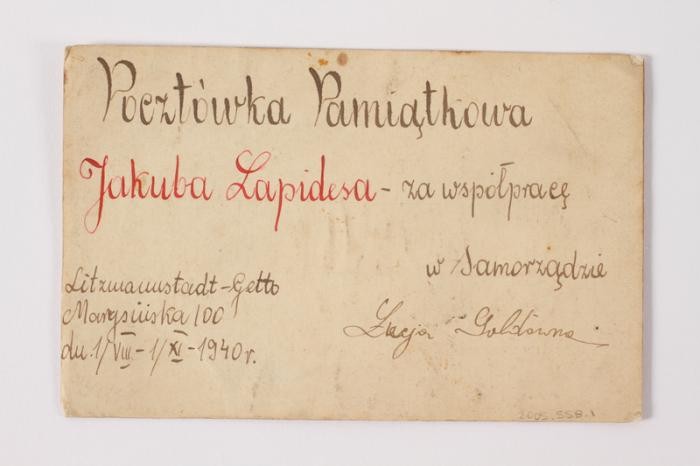
Jakub Lapides
The Jewish children of Lodz suffered unfolding harsh realities after the German invasion of Poland. Some of the children, among them Jakub Lapides, recorded their experiences in diaries. Their voices offer a view into the struggle of a community and its young to live in spite of the most difficult circumstances.
Excerpt
“One day they announced in our orphanage that we will travel to a different place, and we were told 'Take everything you can.' We went out to wait for the trucks to take us. And then my brother Moshe said to me and Miriam, my sister: “Let's hide in the cemetery.” We went and hid there among the gravestones. We saw people bringing huge pots with soup. We were very hungry and Moshe started to go back and we followed him to the food line. We hadn't gotten the soup yet, and the trucks arrived and I said, 'Let's go back to the cemetery.' I ran back. But not Moshe, and not Miriam; they did not come back. They were taken on the trucks.”
—Jakub Lapides, age 17
Jakub's Story
Jakub Lapides was born on November 15, 1928. He had three siblings: Mosze, b. 1925; Sara, b. 1926; and Miriam, b. 1932. Both of his parents died before the war. All four children were placed in orphanages.
When the children moved into the Lodz ghetto, their food situation actually improved. Jewish Council Chairman Mordechai Chaim Rumkowski made sure that the children in the orphanage received more rations than others.
During the Gehsperre Aktion in the Lodz ghetto, Jakub, Mosze, and Miriam fled from the orphanage and hid at the cemetery. They observed what was happening and saw that soup was brought to the courtyard of the orphanage. They could not resist their hunger and jumped out of hiding. Before Jakub, Mosze, and Miriam received their portion of soup, the German trucks came. Only Jakub was able to escape.
Jakub went to live with his maternal aunt Lola, who lived with Jakub's grandmother and her small daughter Mania, who was 4 or 5 years old. Lola told Jakub what really happened during the Gehsperre. Mania was hidden, but the grandmother was thrown from a window.
Jakub, also known as Kuba, got a job in the leather and saddlery workshop and later in the sausage making factory. He became very ill from eating spoiled horse meat in the factory, but his hunger was so great he couldn't stop. He joined the Communist youth group. In March 1944, Jakub was deported to the HASAG slave labor camp in Czestochowa. He was liberated in January 1945.
Jakub returned to Lodz and at first worked for a bakery just to make sure that he would never be hungry. Later, he finished high school. After graduate studies, he became an engineer. Jakub married a fellow survivor. They had two sons and in 1957 they immigrated to Israel. Jakub Lapides died in 2005.
Critical Thinking Questions
Why are diaries an important part of the historical record?
What makes children’s diaries distinct?
How are some of these accounts different from that of Anne Frank?
Investigate the experiences of children in the ghettos.

